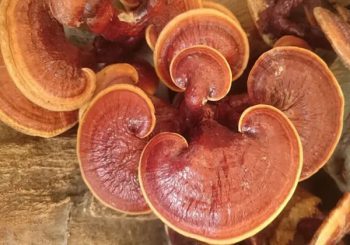 By Sayer Ji
By Sayer Ji
Contributing writer for Wake Up World
The mushrooms commonly known as “reishi” are gaining deserved popularity for possessing near-magical gifts for the human body. Reishi (in Japanese) or ling zhi (in Chinese) have been recognized as a medicinal mushroom for over 2,000 years, with their powerful effects noted in ancient texts, art, religion and even cultural artifacts.[i]
Traditionally ascribed such benefits as enhancing energy, strengthening the heart, increasing memory, tonifying the body and slowing aging, this rare and revered fungus has earned a reputation for being an “herb of spiritual potency.”[ii] Science has even validated reishi’s health-affirming properties, including an ability to control blood glucose levels, support the immune system, protect the liver and fight harmful bacterial infections.[iii]
[pro_ad_display_adzone id=”110028″]
There are more than 200 scientific abstracts on GreenMedInfo.com with evidence of reishi mushroom’s disease fighting properties. In this article, we break down the science that supports reishi’s health-boosting potential in three key areas: cancer prevention, heart health and enhanced immunity to viruses.
Reishi’s Cancer-Fighting Reputation
Reishi mushrooms have been clinically shown to fight a triad of risks — aging, disease and cancer, thanks to a superlative power: the ability to isolate, digest and flush toxins from the body.[iv] This detox support increases the liver’s metabolic efficiency, which can aid the body in disease prevention. Studies on reishi have confirmed that these mushrooms exhibit “significant potency to prevent and treat different types of cancers,” including breast, prostate, colon, lung and cervical.[v]
A 2020 metastudy explored the anticancer effects of various pharmacologically active compounds in reishis — species name Ganoderma lucidum — and their potential modes of action. Evidence was found for a variety of diverse anticancer mechanisms, including modulating the immune system, increasing the metabolic rate of enzyme activity and being toxic to cancer cells, thereby suppressing the expression of proteins required for cancer cell reproduction.[vi]
An article published in the journal Seminars in Cancer Biology summarized progress made in treating metastatic cancer, a form that spreads and migrates within the body, by saying that reishis and other medicinal mushrooms contain cancer-inhibiting compounds that are “useful approaches to target tissue invasion and metastasis as well as other hallmark areas of cancer.”[vii]
An array of studies have ascribed antitumor, antioxidant, blood balancing and unique detoxification properties to G. lucidum and recommended it as an adjunct therapy for cancer treatment. There are even clinical drugs extant today that are derived from polysaccharides and beta-glucans extracted from reishi and other medicinal mushrooms.[viii]
Heart Healthy Reishi Mushrooms
Atherosclerosis is a chronic inflammatory disease characterized by the buildup of plaque in the arterial walls of the cardiovascular system, which can cause blood clots leading to heart attack or stroke. In the U.S., 1 in 4 deaths are due to heart disease,[ix] although atherosclerosis can also affect the brain.
The beta-glucan found in reishi mushrooms has potent antioxidant properties that may guard against atherosclerosis in high-risk patients.[x] Another isolate that has been extracted from G. lucidum mushrooms are polysaccharide peptides (PsP), protein-bound carbohydrate cells that, along with beta-glucans, have been identified as active compounds in reishi mushrooms. PsP, a powerful antioxidant, has been clinically shown to prevent atherogenesis, the formation of fatty plaques in the arteries, in mice models.[xi]
Another way reishis may help protect your heart is by ameliorating the negative effects of the standard American diet. In a 2016 study, researchers observed that a beta-glucans extract derived from reishi mushrooms reduced the inflammation response in mice being fed an unhealthy diet.[xii]
Reishi’s Antiviral Superpowers
Significant evidence backs reishis’ demonstrated potential for keeping your body in a state of health and balance, including helping you fight off viral infections. Reishis have been tested for effects on herpes simplex viruses 1 and 2, known as HSV-1 and HSV-2, or oral and genital herpes, respectively.
A study published in the Journal of Alternative and Complementary Medicine demonstrated that individuals diagnosed with HSV-2 who had experienced recurrent herpes outbreaks for more than one year were aided by an herbal mixture of two powdered reishi-type mushrooms (Ganoderma lucidum, Elfuinga applanata). Results were dramatic: the mix of mushrooms and herbs provided “fast, effective relief from symptoms of recurrent herpes [outbreaks],” with a decrease in symptomatic time of more than 50% compared to controls.[xiii]
Triterpenes are another chemical compound that have been isolated and extracted from reishi mushrooms. Two triterpenes were identified in the spores of G. lucidum as having significant anti-HIV activity, inhibiting the human immunodeficiency virus that causes HIV/AIDS.[xiv] Further research into reishi’s antiviral activity has found that extracts of G. lucidum may help protect against acute respiratory infections like rhinovirus and influenza.[xv]
This demonstrated antiviral activity, combined with anti-inflammatory properties and the ability to protect your body from oxidative stress, makes cold and flu season the perfect time to add reishi mushrooms to your diet or supplement regime. To learn more about the power of medicinal mushrooms, consult GreenMedInfo.com, the world’s most widely referenced, evidence-based natural medical resource.
*WARNING: Always consult a medical herbalist or your health care practitioner when using both natural and pharmaceutical medicines for any diagnosed condition. This article is for informational purposes only and not intended to be used as medical advice.
References:
[i] Wachtel-Galor S, Yuen J, Buswell JA, et al. Ganoderma lucidum (Lingzhi or Reishi): A Medicinal Mushroom. In: Benzie IFF, Wachtel-Galor S, editors. Herbal Medicine: Biomolecular and Clinical Aspects. 2nd edition. Boca Raton (FL): CRC Press/Taylor & Francis; 2011. Chapter 9. Available from: https://www.ncbi.nlm.nih.gov/books/NBK92757/
[ii] Wachtel-Galor S, Yuen J, Buswell JA, et al. Ganoderma lucidum (Lingzhi or Reishi): A Medicinal Mushroom. In: Benzie IFF, Wachtel-Galor S, editors. Herbal Medicine: Biomolecular and Clinical Aspects. 2nd edition. Boca Raton (FL): CRC Press/Taylor & Francis; 2011. Chapter 9. Available from: https://www.ncbi.nlm.nih.gov/books/NBK92757/
[iii] Wachtel-Galor S, Yuen J, Buswell JA, et al. Ganoderma lucidum (Lingzhi or Reishi): A Medicinal Mushroom. In: Benzie IFF, Wachtel-Galor S, editors. Herbal Medicine: Biomolecular and Clinical Aspects. 2nd edition. Boca Raton (FL): CRC Press/Taylor & Francis; 2011. Chapter 9. Available from: https://www.ncbi.nlm.nih.gov/books/NBK92757/
[iv] Reishi, Ling Zhi: ‘Mushrooms of Immortality.’ By Paul Stamets, Contributor. 12/04/2012 08:10am EST | Updated December 6, 2017. https://www.huffpost.com/entry/reishi-mushrooms_b_2200808
[v] Md Faruque Ahmad. Ganoderma lucidum: A rational pharmacological approach to surmount the cancer. J Ethnopharmacol. 2020 Jun 3:113047. Epub 2020 Jun 3. PMID: 32504783
vi] Md Faruque Ahmad. Ganoderma lucidum: A rational pharmacological approach to surmount the cancer. J Ethnopharmacol. 2020 Jun 3:113047. Epub 2020 Jun 3. PMID: 32504783
[vii] W G Jiang, A J Sanders, M Katoh, H Ungefroren, F Gieseler, M Prince, S K Thompson, M Zollo, D Spano, P Dhawan, D Sliva, P R Subbarayan, M Sarkar, K Honoki, H Fujii, A G Georgakilas, A Amedei, E Niccolai, A Amin, S S Ashraf, L Ye, W G Helferich, X Yang, C S Boosani, G Guha, M R Ciriolo, K Aquilano, S Chen, A S Azmi, W N Keith, A Bilsland, D Bhakta, D Halicka, S Nowsheen, F Pantano, D Santini. Tissue invasion and metastasis: Molecular, biological and clinical perspectives. Semin Cancer Biol. 2015 Apr 9. Epub 2015 Apr 9. PMID: 25865774
[viii] Yiran Zhang, Yifei Jiang, Meng Zhang, Lijuan Zhang. Ganoderma sinense polysaccharide: An adjunctive drug used for cancer treatment. Prog Mol Biol Transl Sci. 2019 ;163:165-177. Epub 2019 Mar 25. PMID: 31030747
[ix] Pahwa R, Jialal I. Atherosclerosis. [Updated 2021 Aug 11]. In: StatPearls [Internet]. Treasure Island (FL): StatPearls Publishing; 2021 Jan-. Available from: https://www.ncbi.nlm.nih.gov/books/NBK507799/
[x] Djanggan Sargowo, Nadia Ovianti, Eliana Susilowati, Nizamuddin Ubaidillah, Adriyawan Widya Nugraha, Vitriyaturrida, Kartika Siwi Proboretno, Mirza Failasufi, Fadhli Ramadhan, Hesti Wulandari, Yoga Waranugraha, Dinarsari Hayuning Putri. The role of polysaccharide peptide of Ganoderma lucidum as a potent antioxidant against atherosclerosis in high risk and stable angina patients. Indian Heart J. 2018 Sep – Oct;70(5):608-614. Epub 2017 Dec 14. PMID: 30392496
[xi] Titin Andri Wihastuti, Teuku Heriansyah. The inhibitory effects of polysaccharide peptides (PsP) of Ganoderma lucidum against atherosclerosis in rats with dyslipidemia. Heart Int. 2017 Jan-Dec;12(1):e1-e7. Epub 2017 Apr 12. PMID: 29114382
[xii] Yu-Sheng Wu, Shu-Ying Ho, Fan-Hua Nan, Shiu-Nan Chen. Ganoderma lucidum beta 1,3/1,6 glucan as an immunomodulator in inflammation induced by a high-cholesterol diet. BMC Complement Altern Med. 2016 Dec 3 ;16(1):500. Epub 2016 Dec 3. PMID: 27912745
[xiii] Yasuyo Hijikata, Seika Yamada, Akihiro Yasuhara. Herbal mixtures containing the mushroom Ganoderma lucidum improve recovery time in patients with herpes genitalis and labialis. J Altern Complement Med. 2007 Nov;13(9):985-7. PMID: 18047445
[xiv] B S Min, N Nakamura, H Miyashiro, K W Bae, M Hattori. Triterpenes from the spores of Ganoderma lucidum and their inhibitory activity against HIV-1 protease. Chem Pharm Bull (Tokyo). 1998 Oct;46(10):1607-12. PMID: 9810695
[xv] Ulrike Grienke, Christina E Mair, Johannes Kirchmair, Michaela Schmidtke, Judith M Rollinger. Discovery of Bioactive Natural Products for the Treatment of Acute Respiratory Infections – An Integrated Approach. Planta Med. 2018 Jul ;84(9-10):684-695. Epub 2018 Mar 19. PMID: 29554706
Recommended Articles by Sayer Ji:
- The Power and Mystery of Melanin Explained
- Cell Phone Induced Bodily Harm: How the Bees Can Help
- The Spice That Prevents Fluoride Destroying Your Brain
- How to Clean Your Arteries with One Simple Fruit
- 7 Healing Uses for Lavender Essential Oil
- From Table to Tomb: Cumin’s Health Benefits Rediscovered
- Why You Should Ditch Sugar in Favour of Honey
- The Love Affair Between Saffron and Humanity: As Ancient as Time Itself
- Why Walnut Resembles the Brain It Nourishes
- Magnesium Puts Psychiatric Drugs to Shame for Depression
About the author:
Sayer Ji is the founder of Greenmedinfo.com, a reviewer at the International Journal of Human Nutrition and Functional Medicine, Co-founder and CEO of Systome Biomed, Vice Chairman of the Board of the National Health Federation, and Steering Committee Member of the Global Non-GMO Foundation.
© 2020 GreenMedInfo LLC. This work is reproduced and distributed with the permission of GreenMedInfo LLC. Want to learn more from GreenMedInfo? Sign up for their newsletter here.
[pro_ad_display_adzone id=”110027″]







